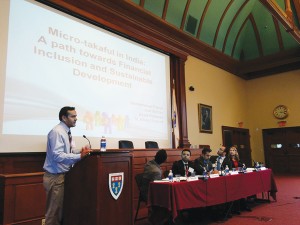By Kashif-ul-Huda
Cambridge, Massachusetts: A three-day 11th Harvard University Forum on Islamic Finance was held last month on the topic of Takaful and Alternative Cooperative Finance: Challenges and Opportunities. On the first day, two papers presented in the Forum discussed ways for financial inclusion of Indian Muslims. Abdul Qadir Buhari who is the Chairman of B.S. Abdur Rahman University in Chennai talked about low deposit to credit ratio of Muslims (47% vs 74% national average) as quoted in Sachar Committee Report. Buhari was presenting a paper on “Achieving Financial Inclusion of Muslim Minorities Through Alternative Shari’a-Based Cooperative Finance Models,” co-authored with Blake Gould of Marquam Capital of Oregan and Saif Ahmed of Infinity Consultants of Bangalore. In their presentation, Buhari and Ahmed talked about models that they have developed that is shariah-compliant and works within the Indian regulations that does not allow for Islamic banking. They talked about three models under the Joint Liability Group (JLG) structure: Mututal Benefit Trust Model, Cooperative Credit Society Model, and Direct Disbursement Model. When they analyzed the three models under Takaful Principles, they found that first and the last model meets all the criteria. In another session, the Aligarh Muslim University team presented a paper on “Micro-Takaful in India: a Path towards Financial Inclusion and Sustainable Development.” The paper was authored by Mohammad Faisal, Asif Akhtar, and Asad Rehman. They proposed a working model for micro-takaful or insurance for members of low income group. They said people of this group are not served by any financial company now and a product designed to help them can be a tool for their financial inclusion. This product is not just for Muslims. They also talked about ways that this model can work within the confines of the existing financial regulation in India.
AUTHOR: Islamic Voice
Islamic Voice is a monthly Islamic magazine published in Bangalore. It is the largest English language Muslim publication in India. It is a comprehensive magazine, places a relatively high emphasis on social issues and strives to have a broad appeal. Since 1987, Islamic Voice has covered its fascinating namesake without fear or favour, with insight, accuracy, thoroughness and a well rounded perspective on a variety of subjects - be it the economy, politics, lifestyle, the arts, entertainment, travel, science, technology or health. That's why Islamic Voice is the country's most widely read publication, a position it has held for more than a decade. And that's why it makes sense to subscribe to Islamic Voice.
We represents all Muslim sects and shades of thought from all over India. We focus on "our" triumphs which, mostly, go unreported as well as constructively addresses our failures and shortcomings.
Editor-in-Chief: A.W. Sadatullah Khan
Genre: Current Affairs associated with Muslims
Subjects Covered:
Human Rights I Analysis I Special Reports I Issues I Book Reviews I National I International I Newsmakers I Community News I Islamic Perspectives I Classifieds I Opinions
Focus articles on:
Education and Children I Inter-faith Relations I Matrimony I Muslim economy I Muslim Perspective I The Muslim world I Society I Travel I The Western viewpoint I Women in Islam
Special focus on Faith and Law:
Fiqh I Hadith I Quran


COMMENTS